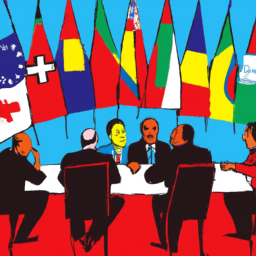The current international order, established after the Second World War, faces numerous challenges in the present day. One significant challenge that threatens the stability and functioning of this order is the rise of authoritarianism. This growing trend, characterized by the concentration of power in the hands of a few, poses a threat to the principles of democracy, human rights, and global cooperation.
In the video, one example of this challenge is highlighted, shedding light on the impact of rising authoritarianism on the international stage. The video emphasizes the need to address this issue and find effective solutions to maintain international peace and stability.
The rise of authoritarian leaders and governments around the world has led to a shift in power dynamics. These leaders often prioritize their own interests over collective global goals, leading to a breakdown in international cooperation. This poses a significant challenge to the current international order, which relies on collaboration and shared values for its effectiveness.
One of the consequences of rising authoritarianism is the erosion of democratic institutions and the suppression of civil liberties. This undermines the principles of freedom and democracy, which form the foundation of the current international order. The video highlights the importance of protecting and promoting these values to counter the challenges posed by authoritarianism.
Another aspect mentioned in the video is the impact of rising authoritarianism on global trade and globalization. Authoritarian leaders often adopt protectionist policies, leading to trade wars and disruptions in the global economy. This not only affects economic stability but also hampers international cooperation and undermines the existing international order.
The challenge of rising authoritarianism also extends to issues of national security. Authoritarian leaders may pursue aggressive foreign policies, leading to conflicts and destabilization. This poses a threat to the current international order, which relies on diplomacy, dialogue, and peaceful resolutions to maintain global peace and security.
The video emphasizes the need for international organizations, such as the United Nations, to play a crucial role in addressing the challenges posed by rising authoritarianism. These organizations serve as platforms for dialogue, cooperation, and collective action, providing a framework for maintaining the current international order.
One of the solutions proposed in the video is the strengthening of international alliances and partnerships. By building strong alliances, countries can collectively resist the influence of authoritarian leaders and promote democratic values. This requires a renewed commitment to multilateralism and a recognition of the shared interests and common challenges faced by nations worldwide.
The challenge of rising authoritarianism also calls for increased support for democratic movements and civil society organizations. These actors play a crucial role in advocating for human rights, democracy, and the rule of law. By empowering these voices, the international community can counter the influence of authoritarian leaders and promote a more inclusive and democratic international order.
In conclusion, the challenge of rising authoritarianism poses a significant threat to the current international order. It undermines democratic values, hampers global cooperation, and disrupts the stability of the global economy. Addressing this challenge requires a collective and concerted effort from the international community, strengthening alliances, supporting democratic movements, and upholding the principles that underpin the existing international order. Only through such actions can we navigate the complexities of the global stage and safeguard the future of international peace and stability.
